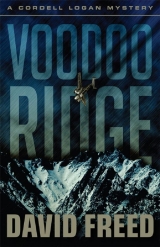
Текст книги "Voodoo Ridge"
Автор книги: David Freed
Жанр:
Триллеры
сообщить о нарушении
Текущая страница: 10 (всего у книги 17 страниц)
“Have You Seen This Woman?” notices and pictures of Savannah went up in store windows and on telephone poles throughout the Lake Tahoe area. Platoons of volunteers scoured the surrounding forests, while I knocked on doors and law enforcement personnel interviewed dozens of prospective witnesses. But after putting in twenty-hour days for more than a week, and sleeping four restless hours a night at the Econo Lodge, I realized that faint progress, if that, had been made. Streeter conceded that he and his fellow detectives could find no trace of Savannah and were no closer to identifying the killer who’d called himself Crocodile Dundee than they’d been at the outset of their investigation.
In the interim, I’d become a celebrity of sorts. Residents recognized me on the street. They weren’t shy about approaching, offering me encouragement.
“Keep the faith.”
“Don’t stop believing.”
“We’re all praying for you.”
I tried to respond appreciatively, but I felt undeserving of their moral support. Savannah had vanished because of me. I was entitled to no one’s sympathy.
“You doing OK, doll?”
Reeking of tobacco, Ruby, the ancient waitress at Steve’s Coffee Shop, patted my shoulder as she refilled my coffee mug.
“Hanging in there,” I said.
“If you need anything else, you lemme know.”
“Thanks, Ruby.”
I stared down at the half-eaten plate of bacon and eggs sitting on the pine table in front of me. My eyes felt heavy from exhaustion. My shoulders ached down deep. I checked my watch for lack of anything better to do: 0649. Another futile day loomed ahead.
“I know you. You’re that guy.”
I looked up slowly.
Standing beside my table, headed for the register, was a tall man with his breakfast check and a ten dollar bill in his hand. He was wearing a battered straw cowboy hat.
“You don’t remember me, do you?”
“I’m sorry,” I said. “I don’t.”
“You were looking for your lady. I was just finishing up a sewer cleanout over on Skyview. It was snowing to beat the band.”
“The Roto-Rooter guy.”
He extended his hand and said, “Dwayne.”
“Logan.”
We shook.
“Tell ya what,” he said, “it’s just a cryin’ shame they haven’t found her yet. I know everybody around here is pulling for you, putting out the positive brainwaves. Everybody.”
I thanked him for his concern and he stood there awkwardly with his hat in his hands, shifting his weight from one boot to another, the way people do when they feel the urge to say more but aren’t sure what to say, or how to say it.
“You mind me sitting down for a second?”
I gestured to the other side of the table. He took off his hat and lowered himself into the chair.
“Listen,” he said, leaning forward, closer, “I don’t mean to speak bad of nobody or anything, but if I was the cops, I’d be looking at all these registered sex offenders they got living around here. There’s hundreds of ’em. They’re everywhere. You can get their address on line.”
“Good to know.”
“It’s a real problem, and most people, they don’t even know about it. I got me one living two doors down. They let him out last year. Six little girls he molested and he gets what, three years? If it was me, I would’ve hung his ass.”
I nodded, in no mood to talk.
“Well, anyway,” Dwayne said, “good luck. I hope they find her and the scumbag who took her gets what’s coming to him.”
“Thanks.”
He walked to the cash register where Ruby was happy to take his money.
When I was in the air force, not long out of the academy, a squadron commander who’d earned a Silver Star flying A-1 Skyraiders in Vietnam told me that he could always find enemy ground forces by listening for them from the air. How, I asked him, can you hear the enemy from a Plexiglass-enclosed cockpit, with a big radial engine roaring in front of you and other pilots or air traffic controllers chattering loudly inside your helmet?
“You open your ears,” he said, “close your eyes, and just… listen.”
Years later, on tank-busting missions over Iraq, I did the same thing. I can’t explain why, but the tactic often worked.
Talk to me, Savannah. Where are you? Help me find you.
I closed my eyes and opened my ears, listening for her, hoping to feel her, but all I heard was the metallic scraping of forks and knives on breakfast plates, and the low murmur of conversations, punctuated by occasional laughter among my fellow diners.
My appetite was gone. I gulped a last sip of black coffee, deposited enough cash on the table to cover my meal and cigarette money for Ruby, and left.
Inn keepers Johnny and Gwen Kavitch, accompanied by their panty-sniffing son, Preston, were walking into the restaurant as I exited. We crossed paths without exchanging words. The elder Kavitches kept their eyes to the ground, pretending not to recognize me. But as Johnny held the door for his wife, Preston turned toward me and leered.
True Buddhists believe in the cultivation of forgiveness and kindness through love. Cultivate enough goodwill, they assert, and you can insulate yourself from the coldest of insults. I’d like to believe that someday I’ll get there. On that frigid morning, I restrained myself from wiping the grin off Preston Kavitch’s face and turning him into a human pretzel. Call it progress.
There was little left for me to do in South Lake Tahoe but drive around, dowsing as if for water, hoping divine intervention might somehow lead me to Savannah. It all felt so futile.
I headed to the airport to retrieve Savannah’s luggage and the duffel that I’d left behind with Marlene, and to head home.
“You’re not listening to me,” she kept saying into the phone, bent forward in her chair, rubbing her forehead. She glanced up as I walked in and raised one finger as if to say she’d only be a minute. “We can sell the house. It’s not about the bills, honey, it’s about making our marriage work. Look, I’ve gotta go. I’ll call you back.”
I waited until she signed off.
“Problems on the home front?”
“Money issues.” Marlene forced a smile. “What else is new, right?”
She fetched our bags from a closet and offered me some cookies for my flight back to Rancho Bonita, which I declined. Sweets were the last thing on my mind.
FOURTEEN
Piloting a small airplane is not unlike sex. If done well, both can be ecstatic, mind-blowing experiences. Done poorly, embarrassing disaster bodes. Do either long enough, and you learn to perform without consciously thinking about performing, satisfying the needs of the moment while your mind focuses elsewhere.
As I flew the Ruptured Duck home that morning, my thoughts remained focused on the man who’d taken Savannah from me. Who was he? Why did he do what he had?
I knew that he had to have been acquainted with Chad Lovejoy, and that he lived in proximity to Lake Tahoe. After all, the two of them on relatively short notice had hiked up to the crash site together. They’d found uranium, realized its potential value, and Lovejoy had lost his life for it. Streeter surmised that Lovejoy had told Dundee all about me, how I was a pilot, how I’d spotted the downed airplane, and how Savannah and I were staying at a local B&B, where Dundee subsequently abducted her to strong-arm me into airlifting his ill-gained treasure out of Lake Tahoe.
The problem was that Lovejoy had done time in state prison. He’d interacted with innumerable other inmates, many of whom, like him, had since been released from custody. Dozens lived in and around Lake Tahoe. Any one of them, Streeter believed, could have been Dundee.
“It’s going to take time,” Streeter admitted before I took off for Rancho Bonita. “I’d advise you not to get your hopes up.”
“What hopes?”
He didn’t have to tell me that the more time passed, the more likely it was that Savannah was dead.
“Cessna Four Charlie Lima, contact Rancho Bonita Tower, one-one nine, point six.” The approach controller’s voice in my headset jarred me from the depths.
“Point six,” I responded. The GPS showed a twelve-minute ETA. I switched frequencies on my number two radio. “Tower, Cessna Four Charlie Lima, VFR descent.”
“Cessna Four Charlie Lima, descent, your discretion.”
One thought consumed me: that after I landed, I had to find a way to identify Dundee. And kill him.
* * *
Rarely do I sleep more than two or three hours at a stretch without waking up in physical or emotional discomfort – the legacy of having played too many contact sports, and of having killed too many people. Sometimes I can nod off again before dawn, but not always; I’m lucky on some nights if two or three hours is all I get. When I got back from Lake Tahoe that afternoon, perhaps ironically, I slept twelve hours straight. Kiddiot was crouched on my chest when I woke up, purring and licking my chin. That was a first, too.
Scientists say pets have a sixth sense when it comes to human behavior. They can detect nuances in mood that even people closest to us typically can’t. I had always assumed that Kiddiot was born without any sense. And so, when he seemed intuitively to fathom my depression and sought to comfort me, if that is in fact what he was doing, I was somewhat stunned.
“I take back every insensitive thing I ever said about you.”
When I reached up to stroke his ears, he dug his claws into my ribs and spring-boarded out his rubber cat door like his tail was on fire.
The author Robert Heinlein once said, “How we behave toward cats here below determines our status in heaven.” As I watched Kiddiot go, the door flapping in his wake, I allowed myself a small smile, but only for a moment; Savannah, after all, was still gone.
A new prospective student named Stefan Weber had left a message on my answering machine in Larry’s hangar while I was up north, saying he was interested in flying lessons. We’d made arrangements to meet at 0930 for his one-hour, fifty-dollar introductory flight. My watch showed 0820.
I yawned and stretched, did a few half-hearted push-ups, climbed into the shower and stood under it for a long time, hoping the hot water would steam away my sense of loss. It didn’t. I toweled off, dressed, got in my old Tacoma, and drove to the airport.
It was something. And anything was better than dwelling on what had happened to Savannah.
* * *
“Sweet Jesus,” Larry said. He was peering at me through his thick lenses with his jaws parted, revealing teeth that had never been to the orthodontist. “She was kidnapped?”
I nodded.
“Do they know who did it?”
“No.”
We were standing outside his hangar, beside the Ruptured Duck, waiting for my new flight student to show up.
“I’m really sorry, Logan. I had no idea. It must be hard. I know if something like that ever happened to my wife, much as we’d both like to hire a hit man sometimes to have each other whacked, I’d feel like crap, too.” His voice cracked and he swabbed a sausage finger behind the right lens of his glasses. I’d never seen Larry display emotion of any kind beyond anger.
We were both silent.
“Well, at least you got a student,” he said after awhile, “something to keep your mind busy, right? Been awhile since you had one of those.”
“True.”
He shook his head again and said to himself, “Goddamn,” staring at his steel-toed work boots, filthy with oil stains. The front of his gray, grease-streaked T-shirt bore the words, “I hate being bipolar. It’s awesome!”
“Don’t worry about me, Larry. I’ll be all right.”
He offered to buy me a beer after work. I reminded him I didn’t drink.
“OK, a burrito, then.”
“Actually, I’m having dinner tonight with Mrs. Schmulowitz.”
“Oh, that’s right,” Larry said. “You and the old lady watch football Monday nights.”
“Take a rain check, though?”
“Fair enough.” He paused, struggling to come up with something appropriately profound to say. “Well anyway, the sun also rises, or something like that, right?”
“Let’s not make assumptions before all the facts are in.”
Larry grunted like he was more or less amused and then, in that awkward, halting manner by which heterosexual men typically express affection for each other for fear that anyone might accuse them of being gay, reached out and gripped my left shoulder as if he were squeezing a cantaloupe at the grocery store.
I realized after he walked away that he’d left a greasy, perfectly defined paw print on my last clean polo shirt.
* * *
“I’m prone to motion sickness,” my would-be student, Stefan Weber, said as we flew lazy eights 2,000 feet above the ocean.
I forced myself to break off thinking obsessively about Savannah and looked over at him sitting in the left seat, eyes wide with fear, clutching the control yoke in a two-handed death grip.
“Say again?” I said.
“I said, I’m prone to motion sickness.”
Stefan’s pallid face, squished between the earphones of the communications headset he was wearing, resembled a loaf of white bread trapped in a vice. He was twenty-five, a balding CPA who’d admitted within the first five minutes of our meeting that he’d never been on a real date, and that the only reason why he was tentatively considering taking flying lessons was because he’d never done one crazy thing in his life, except for the time he’d spray painted “Accountants do it between the spreadsheets” on the wall of his college dorm.
“I think I’m going to be sick.”
“It’s OK, Stefan, you’re doing fine,” I said, taking the controls. “I have the airplane.”
I leveled the wings and told him to take nice, deep breaths, keeping his eyes on the horizon.
“There’s a vent control right there on your left. Why don’t you open it up and get some nice cold air going on your face, OK?”
He opened up the vent.
“A little more air, Stefan. There ya go. Just relax now. See? Nothing to worry about.”
I reached into the storage pocket of my seat back and pulled out a paper airsick bag. When I looked over at him again, my student was the color of the Chicago River on St. Patrick’s Day.
“Here, buddy, take this.”
Stefan reached for the bag – a half second too late. He opened his mouth and yodeled a torrent of half-digested nastiness that somehow missed me while splattering him and much of the instrument panel. For a small man, he hurled a prodigious amount of vomit.
“I’m really sorry,” Stefan said, wiping his mouth, embarrassed. “I probably should’ve said something earlier.”
“No worries. Happens to the best of us. We probably should head back.”
He nodded glumly.
We were on approach to the airport, on base leg, when the Duck’s over-voltage red warning light suddenly came on. I knew from prior experience that when the light illuminated, there was a problem with the electrical system – a sensor or maybe the master switch. Larry would have to do some trouble-shooting, and that would take time. It would also take money I didn’t have. Fortunately, Stefan didn’t notice the light. He didn’t seem to notice anything except the noteworthy amount of rejected breakfast in his lap.
After we landed, he offered to help clean up the Duck. I told him I appreciated the gesture, but that it really wasn’t necessary. He wrote me a fifty dollar check and said he’d give thought to the notion of additional lessons. I knew he wouldn’t be back. Nobody in the history of general aviation has ever wolfed their cookies on an introductory flight and come back for more.
The sky was virtually cloudless, the breeze nary a whisper. Another perfect, room-temperature day in paradise. Larry loaned me a pair of rubber gloves, rags, and a spray bottle of cleaner, and said he’d take a look at the electrical system after I de-vomited the Duck. He didn’t ask how the lesson had gone. He could see and smell the result.
It took me more than an hour to wipe down the inside of the plane. In a weird way, I didn’t mind; it kept my thoughts from Savannah, if only for a while. I was tempted to give Streeter up in Lake Tahoe a call after I finished, but I knew he would’ve called me if there were any worthwhile developments in his investigation.
I watched a gray Cobra gunship come thundering in to settle gingerly down on the tarmac near the Hippo Grill on the field’s east side, followed seconds later by another Cobra. The two attack helicopters were up from the Marine Corps’ Camp Pendleton, north of San Diego. They flew into Rancho Bonita frequently, ostensibly on training missions that not coincidentally also afforded ample opportunity to flirt with the Hippo’s many comely waitresses.
“Thought you could use a cold drink,” Larry said, walking up from behind me with a Coke in his hand.
I thanked him, opened the can, and sipped. We stood and watched the four marine crewmen in their tailored flight suits and cool-guy sunglasses stroll toward the Hippo.
“Those guys get all the chicks,” Larry said, stroking his Grizzly Adams beard. “Tell ya what. If I dropped a hundred pounds, got Lasik on my eyes and a full Brazilian, I’d give those leathernecks a run for their money.”
“I’m sure you would, Larry.”
He looked over at me, his brow furrowed.
“No witty retort, Logan? No, ‘The day you get girls is the day congress gets anything done?’ ”
“Not today, Larry.”
He nodded like he understood. “I gotta run out for a while. The wife wants me to go carpet shopping. You lemme know if you need anything else.”
“Thanks, buddy.”
I lingered for a few minutes, buffing dead bugs off the leading edges of the Duck’s wings, then gathered up the cleaning supplies, dropped the rags in a covered trash can in Larry’s hangar and walked back to my cramped, depressing, windowless office. The pile of paperwork atop my government surplus desk demanded to be culled and filed, but I couldn’t muster the energy.
I sat down, put my feet up, and stared into space for the better part of an hour. I guess you could call it meditating, though it was really more like trying to put my brain in neutral and not think about anything. After that, I drove home and told my landlady about what had happened. About the wrecked Twin Beech and the dead pilot at the controls. About the young man lying dead beside the wreckage. But mostly about Savannah.
Mrs. Schmulowitz listened with her right hand clasped over her mouth, and wept.
* * *
The Giants were playing the Bears that night. Mrs. Schmulowitz served her usual excellent brisket with green beans in cream sauce, which we ate off metal TV trays, while she offered her usual play-by-play commentary on the game, broadcast on her ancient Magnavox console.
“God forbid this guy should actually hold on to the ball,” she complained after the Giant’s tight end muffed an easy pass. “That schmegegge couldn’t catch the common cold if his life depended on it.”
She was garbed in a blue New York Giants hoodie that was about five sizes too big, an oversized Giants baseball cap, a pair of blue Giants sweatpants, and fuzzy pink bedroom slippers that looked like bunnies.
“It’s just a game, Mrs. Schmulowitz.”
“A game? A game?” Sitting beside her on her blue mohair sofa, she looked over at me like it was the craziest thing she’d ever heard. “Football’s not a game, bubby. Football is life.”
I didn’t argue her point. Mrs. Schmulowitz came from gridiron nobility – her late uncle was NFL Hall of Fame quarter-back Sid Luckman. She certainly knew more about football than any old lady I ever met.
“More brisket, bubby?”
“I’m good, thanks.”
“How ’bout beans? I got plenty.”
“Not for me, Mrs. Schmulowitz. I couldn’t eat another bite. It was all delicious. Thank you.” I stood and headed for the kitchen. “Can I get you anything while I’m up?”
“No, nothing, not a thing. I eat one more bite myself, you’ll have to call those cute paramedics to come give me mouth-to-mouth. Come to think of it, maybe I will have more brisket. Then you can give ’em a call for me, OK?”
“Whatever you say, Mrs. Schmulowitz.”
I knew she was kidding about more brisket, trying to cheer me up. I deposited my plate and silverware in the sink without offering to help clean up because I knew she’d only take offense, as she had after previous offers. Back in the living room, the Giants running back got stuffed for a two-yard loss.
Mrs. Schmulowitz threw up her hands in exasperation.
“Can you believe this interior line play? Oy gevalt It’s a horror! Even I can trap block better than that.”
“Just wanted to say good night, and thanks again for dinner.”
She gave me a disconcerted look. “It’s not even the fourth quarter yet.”
“I’m thinking of turning in a little early, doing some reading.”
The old lady’s cataract-clouded eyes pooled with tears. She said she knew what I was going through, and that her heart ached for me. She told me how one of her brothers had joined the army, gone off to fight in North Africa, and been declared missing in action. Nearly a year transpired before the family received a letter via the Red Cross saying he’d been captured and was in a German POW camp, homesick but otherwise well.
“In the words of Tom Petty,” Mrs. Schmulowitz said, “the waiting is the hardest part.”
“How do you know Tom Petty?” I asked her.
“How do I know Tom Petty? I know Tom Petty because he’s older than I am.” She got up and turned off the TV. “Listen, before you go, there’s something I need you to do for me, a big favor.”
“Name it.”
“I need you to come with me to my watercolor class tomorrow.”
“I’m not much of a painter, Mrs. Schmulowitz.”
“Like anybody in the class is a painter? They’re relics, old as dirt, everybody in there. Half the people, their brains have turned to Cream of Wheat. The point’s not to paint, bubby. The point is, I just want you to come with me.”
“Why?”
“Why? It’s a surprise, that’s why.”
“I don’t like surprises, Mrs. Schmulowitz. And I’ve had more than my share recently.”
She put her arms around my waist. I could feel most of the bones in her body.
“You have an obligation to go on living, Cordell. For her. For you. Regardless of where she is right now. The sooner you start doing that, the better off you’ll both be.”
She promised the painting class would do me good.
“I’m an old lady, bubeleh. Humor me.”
Mrs. Schmulowitz was a force of nature. What choice did I have?
* * *
Kiddiot slept on his back at the foot of my bed that night with all four paws up and his tongue lolling out the side of his mouth, while I stared at the ceiling, anguishing over the choices I’d made, replaying on a continuous loop the hours leading up to Savannah’s disappearance and my attempts to find her in the hours afterward. What could I have done, short of never spotting that airplane in the first place, that would have let me roll over and find Savannah sleeping contentedly beside me? What clues had I missed? The guilt, incompetence, and helplessness I felt were palpable, weights that pressed like concrete on my heart. I thought I might vomit, but didn’t. I got up, drawing a disapproving sneeze from Kiddiot who didn’t appreciate being disturbed, and went outside.
The night was still. No moon. I gazed up at the southern sky, through the dark, outlying branches of Mrs. Schmulowitz’s oak tree, to the three stars of Orion’s Belt. To their right was a V-shaped pattern of stars – the face of Taurus the Bull – and, slightly beyond the bull’s face, the star cluster known as Seven Sisters.
To the average eye, the Sisters look like a small, blurry cloud of light. But if your vision is keen, you can discern all seven stars. For centuries, Native Americans used the star cluster as an eye test of sorts; only those would-be fighting men with the acuity of vision to see all seven stars were allowed to join the most elite warrior sects. Often, when I was at the academy, I would walk onto the parade grounds at night, lie down and gaze up at the Sisters, if only to reassure myself that I had the right stuff to be a pilot. Inspiration often followed my stargazing. But as I stared into the heavens that night from my landlady’s tidy, postage-stamp backyard, all I felt was lost, adrift amid the cosmos.
More than anything, I felt alone.








